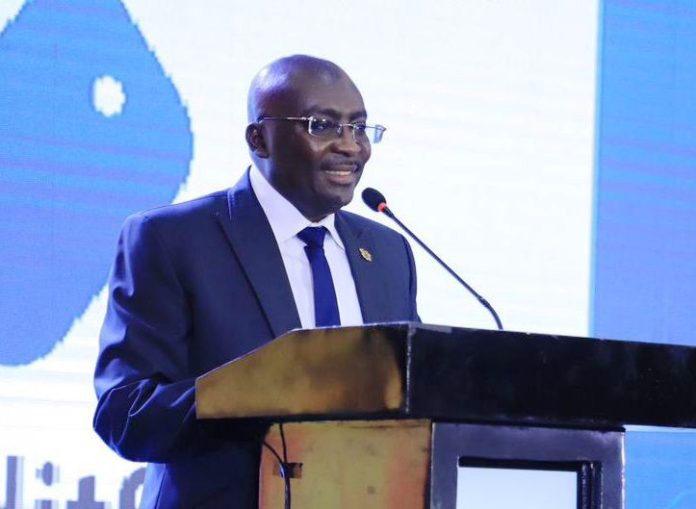The Flagbearer of the New Patriotic Party (NPP), Dr Mahamudu Bawumia, says contrary to claims by former President Mahama that he has abandoned economics to pursue digitalisation, he is rather using the later to solve economic problems facing the country.
According to him, during the era of President Kufuor, when he served as a Deputy Governor of the Bank of Ghana, he conceived the idea of digitalising the economy, including introduction of credit score system. He subsequently sponsored a legislation to back it.
Speaking at the launch of his much talked about Credit Score System in Accra yesterday, Dr Bawumia regretted that after the NPP government left office after the 2008 elections, very little progress has been made in the area by the succeeding government.
“When we came back into office in 2017, I was keenly aware of what we needed to do to get broad-based individualised credit scoring to take off in Ghana. This is partly why we introduced the Ghanacard, Digital Address system and Mobile Money Interoperability to address financial inclusion, the integration of various databases across government under the Citizens App platform.
“A key part of my broader vision is to create an interconnected and efficient digital government to move away from the disjointed and delayed public service delivery that has long plagued the government sector. In our quest to achieve a more efficient digital economy, key components such as: Data interoperability, which is a single instance of data across all government agencies, the use of cybersecurity and blockchain to create a robust system that protects citizens’ and government data as well as ensure secure transactions for government interactions, A centralized AI database for improved government operations among others have been implemented.
“Through the CitizenApp’s data interoperability system (CADIS), which we learnt from Estonia, we are creating a digital framework that links all government agencies, allowing data to flow seamlessly between them. This interoperability system is crucial for improving the speed and quality of government services.
“The system will reduce bureaucracy and streamline data sharing across agencies, as well as eliminate the need for repeated paperwork. Ghana’s CADIS is the equivalent of Estonia’s X-ROAD data interoperability system.
“Interestingly, when I was pushing for the implementation of these projects many people said I had abandoned economics to pursue digitalization! They did not understand that I was using digitalization to solve economic problems!!!
“The launch of MyCreditScore introduces a critical tool that will transform the Ghanaian’s access to credit and financing. This initiative comes at a crucial time for Ghana’s financial sector.
“Recent data from CEIC Data reports that as of August 2024, Ghana’s non-performing loan (NPL) rate stands at a troubling 24.3%, with an unprecedented peak of 26.7% earlier this year.
“Such high NPL levels reflect challenges within our financial ecosystem, where the lack of a standardized, transparent credit scoring system has contributed to elevated risks for lenders and limited financial inclusion for borrowers.
“The introduction of MyCreditScore represents a pivotal step toward addressing these challenges, aligning Ghana’s credit ecosystem with international standards and promoting a culture of responsible borrowing. Notably, results from the MyCreditScore pilot demonstrate a stark improvement, achieving an NPL ratio of just 1.4% – a remarkable contrast to the 20.7% average reported in 2023 by the Bank of Ghana.
“By enabling a fairer and more consistent evaluation of creditworthiness, MyCreditScore is expected to reduce defaults significantly, strengthen confidence among financial institutions, and expand access to credit for individuals and businesses alike.
“The initiative reflects a broader commitment to sustainable economic growth, where financial stability and trust in credit practices play foundational roles.
“With the implementation of systems like MyCreditScore, Ghana is poised to transition into a financial ecosystem that not only facilitates responsible borrowing and lending practices but also drives economic resilience and inclusive growth for all stakeholders.
“This system is designed to reward financial responsibility, offering individuals the opportunity to demonstrate their creditworthiness transparently and confidently.
“For the first time, Ghanaians will have access to a credit score that can open doors to improved financing options, helping them to realize their goals and contribute to economic growth.
A credit score is much like a financial report card. It quantifies your payment history, debt levels and credit behaviour into a single number, making it easier for banks and other lenders to assess your financial reliability.”








